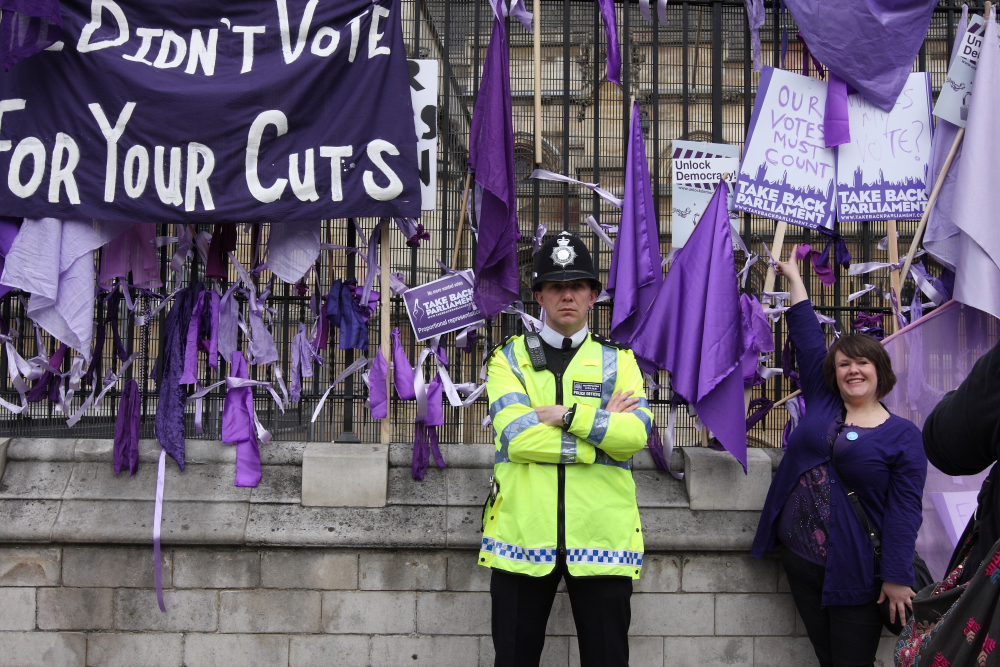The discussion around Proportional Representation (PR) is gathering steam among part of the Labour Left. The Independent reports that three-quarters of Labour members now support PR. 228 Constituency Labour Parties have signed a call for electoral reform. The call for PR has even been taken up by the left-wing faction Momentum. The current discussion has been provoked by two recent incidents.
First is the leadership election for the UNITE trade union, following the retirement of left-wing general secretary Len McCluskey. After leftist Howard Beckett withdrew, there are now two candidates from the left of the union – Steve Turner and Sharon Graham. This leads people to worry that the right-winger Gerard Coyne will slip through and win the election on a minority vote.
This is not the place to discuss the intricacies of the UNITE elections, but the election shows the danger of the First Past the Post (FPTP) system. The person with the most votes takes all, even if they are disliked by a majority of the voters. This is why many UNITE activists are calling for a Single Transferable Vote (a form of PR) in future elections.
Slump of Labour vote under Starmer
But the main reason for all the PR chatter is in reaction to “Sir” Keir Starmer continuing to lead the Labour Party into political oblivion. Two years ago, under Jeremy Corbyn, the party suffered unprecendented attacks from the press and sabotage from many people working for the party. Starmer supporters followed Tony Blair in sneering that “with any other leader, Labour would be 20 points ahead”. The results since Starmer took over have been derisory.
Just last month, there was the Hartlepool by-election, caused by the resignation of sitting Labour MP Mike Hill following allegations of sexual harassment and intimidation. Hartlepool is a working-class seat which has had a Labour MP since 1964. Any Labour candidate should have won easily – even Starmer’s choice, the Saudi-loving sexist Paul Williams.
It is very unusual for a ruling party to win a by election in a constituency that it lost in the previous general election. By elections tend to show protest votes against the incumbent government. Before Hartlepool, the government party had only ever retaken a seat in a by election 17 times – and only 5 times since the Second World War. Yet Labour still managed to lose Hartlepool to the ruling Tories.
Hartlepool was followed by Chesham and Amersham. Starmer’s apologists had said that Labour could not possibly have won Hartlepool, because prime minister Boris Johnson was benefiting from a “Covid bounce”. Yet the Liberal Democrats won Amersham with a 25% swing. Labour won only 622 votes – reportedly 2 more than the number of Labour party members in the constituency. It may be worth noting that in 2017, under the leadership of Jeremy Corbyn, Labour won 11,374 votes.
Since the election debacles, a number of people who should know better have been gleefully welcoming the defection of former Tory MP John Bercow to Labour. It should be pointed out that while Bercow has criticised Boris Johnson, he has not issued a single statement to say that his own politics have changed.
At the same time, these same people wilfully ignore the facts that: some Labour activists are leaving the party; others are staying in for the while but are withdrawing from activity; while other socialists are still being expelled on trumped-up charges. Even Jeremy Corbyn is still not allowed to sit as a Labour MP.
Time for a “Progressive Alliance”?
This is the background to a swath of articles in the left-leaning media, calling for a “Progressive Alliance”. This is where Labour, the Lib Dems, the Greens and maybe the SNP agree to stand down in elections, to enable a single anti-Tory candidate. Neal Lawson from Compass wrote in this week’s Guardian “there is no other way to stop a record fifth straight Conservative election victory, and the slide into a one-party state, than through a progressive alliance.”
Lawson’s example of a successful Progressive Alliance is the “remarkable relationship” (his words) between Tony Blair and former LibDem leader Paddy Ashdown. He also argues that “the societal challenges we face – of climate, culture, care, technology, ageing and inequality – simply can no longer be met by any single party.”
The campaigns for a Progressive Alliance and for PR are closely connected. In an editorial supporting a Progressive Alliance, the Guardian argued “Proportional representation is a way of redistributing power more fairly and encouraging consensus to be built across party lines.” Similarly, the organisation Reboot GB argues that PR “is an anchor for any Progressive Alliance”
A Progressive Alliance seems to have two main types of supporter on the Left. First there are the deluded, who believe that Lib Dems will break with the habit of a lifetime and support a full socialist platform. There is absolutely no reason to believe this. Remember that as recently as 2010-2015 the thoroughly neo-liberal Liberal Democrats were eagerly propping up a Tory government. And yet they would have the power of veto over any Progressive Alliance.
As for the social democratic nationalist parties, it is not long since Labour joined the Conservatives in the Better Together campaign aimed at preserving the Union and blocking Scottish independence. There is little evidence that Labour has moved from this position. Why on earth would the SNP or Plaid Cymru sign up to that?
Wouldn’t anything be better than Boris Johnson?
Then there are the desperate, who believe that Boris Johnson’s Tories are so qualitatively bad that anything must be better than this, even neo-liberalism lite. This view has the advantage that it acknowledges the reality of who the Lib Dems represent, and what they stand for. Note that it is no coincidence that Amersham is the 531st least deprived of England’s 533 parliamentary constituencies.
How things have changed since the heady days of Jeremy Corbyn. Jeremy Corbyn’s 2017 election manifesto was both radical and popular. Labour Party membership tripled to 550,000 and between 73% and 83% of voters supported his plans to nationalise water, electricity, gas and the railways.
Even this manifesto was only possible in the face of opposition and even sabotage by a large number of Labour Party workers and a majority of Labour MPs. The idea that the Lib Dems would campaign for such a manifesto, or even allow it to come into being is a fantasy. Any Progressive Alliance depends on Labour having a programme which promises no fundamental change.
So what we are left with is a set of bland statements promising nothing more than “at least we’re not Boris Johnson”. In other words, the unsuccessful policies that Starmer has been following since he became party leader. This has not just led to a haemorrhaging of support for Labour. It also means that the many activists who were keen to campaign in 2017 will not be inspired next time round.
A “Progressive Alliance”, which handed power to the Tory enablers in the Lib Dems would reproduce the worst experiences of Starmerism, without offering voters any positive reasons to vote Labour or even giving party members a good reason why they should campaign. This will damage Labour’s vote even further.
Why now?
The current obsession with PR and “Progressive Alliances” is, at least in part, a hangover from old discussions about Brexit. A large part of the liberal-Left believed Brexit to be the most important political idea of the day. That meant that their conversation shifted away from the progressive demands in Corbyn’s manifesto.
It also caused many Labour members to seek alliances with a Liberal Democratic party, whose leader was not sure whether Gay sex was a sin, and whose 2019 election manifesto was described by the BBC as being more austere than the Tories’. This may have gone down well in the middle class clubs attended by Labour’s movers and shakers, but appalled working class voters, particularly in the North of England.
Allying with the Lib Dems was always a mistake. When Brexit was being pushed by the media as the only story that mattered, it was at least understandable. Now that Brexit no longer dominates political discussion, Labour has a chance to return to the class-based politics which caused people to enthusiastically campaign for a Corbyn government. Or, on the other hand, it can continue to cozy up to the Lib Dems.
Notwithstanding any criticism we may have of Labour under Jeremy Corbyn, tens of thousands of people were enthused to go out on doorsteps to campaign for a manifesto which promised to change the world. Could we seriously expect similar excitement for an election campaign which has been approved by the Lib Dem’s hapless leader Ed Davey?
Does this mean that PR is a bad idea?
I used to be a fervent supporter of the FPTP system. We were living in slightly different times then. The Conservatives were clearly the party of Capital and bigotry. Labour – in part through its links with the trade unions, and often despite its political practice – was the party of the working class. The other parties didn’t stand for much at all, and rarely had any serious link with progressive politics, let alone class struggle.
This meant that it was generally a ‘Good Thing’ that elections were contested by the parties which represented – however vaguely – the two sides of class struggle. Even though Labour rarely implemented serious change (and when they did it was more likely to be restricting immigration than fighting racism), a Labour victory was seen as a win for ‘Our Side’. This was something which positively affected workers’ confidence to fight back.
Then a number of things happened. Perhaps most important is what has been called the Pasokification of European Social Democratic parties. This was most noticeable in Greece, but was a trend in most European countries. “Pasokification” involved social democratic parties like Labour shifting to the right as a reaction to falling votes.
In Britain and Germany we saw the Blair-Schröder paper attacking the rights of workers and the unemployed. Britain also experienced Tony Blair’s enthusiasm for the Gulf war. That led to a decreasing number of working class people identifying Labour as being “their” party. Even my mother – a lifelong Labour member – asked me who she should vote for now.
Partly as a result of this, some nationalist parties – like the SNP and Plaid Cymru – which had traditionally had fairly right wing programmes, started positioning themselves as social democrats. They overtook Labour on the Left. Other parties – like Arthur Scargill’s Socialist Labour Party or Respect – emerged, leading to the hope for a serious left-wing challenge to Labour. A main reason for their lack of success was FPTP.
Will PR save Labour? I hope not
The main argument currently used for PR seems to be that it is necessary to revive the Labour Party. Only under PR, the argument goes, will we have a chance of a Labour government – albeit in coalition with the Lib Dems. Without PR, Labour will never govern again. As Polly Toynbee argued in the Guardian, “If Labour doesn’t fight our broken electoral system, it could be out of power for ever.”
My argument for PR is quite the reverse. I want PR because I want to destroy Labour and replace it with something better. The last year under Starmer has proved the party to be unfit for purpose. Even under Corbyn, there were too many unelected functionaries who were able to block progress. Even the great 2017 manifesto was seriously flawed, with promises like 10,000 extra police.
I want a party that is more democratic, more anchored in social movements, more socialist. The problem is that, because of the electoral system, it has proved impossible to create such a party from scratch. The closest we have come to this was with the formation of the Respect party, and the election of the first MP left of Labour since 1950.
There were 2 problems with these developments. First, that MP was George Galloway, whose politics can be politely described as inconsistent. He made some great speeches against the war, but has more recently been seen palling up with Nigel Farage and urging Scottish voters to vote Tory to preserve the Union. His defence of Julian Assange against rape charges was that “not everybody needs to be asked prior to each insertion”.
Second, there was no serious break from Labour. Galloway was the only leading figure who moved from Labour to Respect. Most other people who opposed the war either stayed in Labour or moved into inactivity (often both). Respect aspired to be more than an electoral party. And yet its inability to win elections (with one exception) meant that it lacked the basis to become a mass party.
PR alone is insufficient
Under PR this could be different and we might see the basis for the emergence of a British SYRIZA, Podemos, or even die LINKE. We must attach several caveats to this statement. Firstly, the recent experience of all these parties shows that the formation of a new Left party is not a cure-all. Radical formations can still quickly descend into parliamentary cretinism and compromise.
Secondly: PR will not automatically benefit the Left. There is a reasonable argument that one reason that the next French President may be an outright fascist is the PR system. And in Britain, Ell Foran from Stats for Lefties estimated that UKIP, which won just one seat in the 2015 general election, would have won 79 seats under PR.
So, it would be a great mistake to advocate PR as a way of solving all our problems. PR opens an arena in which the Left can gain exposure and support. But it opens the same arena to more pernicious and dangerous forces. Merely changing the voting system is insufficient without political change at the basis.
A new party which unites the people who joined Corbyn’s Labour with the radical Left outside the party would be a massive step forward inside British politics. Yet, while I believe that parties are important for bringing activists together, without activity at the basis of society, Left parties are impotent. This means that any campaign for a different voting system must be secondary to action from below.
How can we change society?
The key thing lies in understanding how we can change society. Only this week, we have seen the unprecedented conviction of policemen responsible for the racist murders of George Floyd and Dalian Atkinson. This is testament to the ability of movements like Black Lives Matter to effect change. Similarly, the fact that the environment is on the political agenda is the result of the international mobilisations by Fridays for Future.
Even parliamentary reform is dependent on extra-parliamentary struggle. In 1974, Tory prime minister Ted Heath called a general election under the slogan “Who governs Britain – the unions or the government?” Striking miners and other social movements showed Heath that it wasn’t him. The reason that Starmer’s Labour is in decline is to a large extent because it no longer has any organic link to movements outside parliament.
So, a campaign for progressive politics should not start with a demand for PR. This is not least because the implementation of PR would depend on the votes of a Tory government which is perfectly happy to profit from the current system. The best way to challenge the Tories is not by moral outrage but by building social movements which challenge everything they stand for.
If we build up these movements, other changes will follow.
Thanks to Hari Kumar, Carol McGuigan and Anna Southern for comments on an earlier version of this article.




